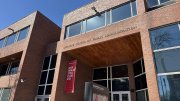Construction continued apace in early February on the foundations of Harvard’s first science complex in Allston, a roughly 1-million-square-foot, billion-dollar facility slated to house the Harvard Stem Cell Institute (HSCI), bioengineering initiatives, and the University-wide department of systems biology. Workers have been waterproofing the exterior cement walls and erecting the below-grade portions of the structural steel beams and columns for the first of four buildings planned for the site.
Yet a carefully worded University statement in January said that an “assessment of the project and the environment in which it is being developed” continues, a reference to the unfolding financial crisis (see "The Fiscal Crunch"). Emphasizing that “scientific excellence is first and foremost about people and programs,” University spokesperson Lauren Marshall said that even though “changed financial realities have dictated thorough review” of all capital planning, Harvard’s “commitment to interdisciplinary science will be sustained….”
The University’s institutional master plan for Allston, originally expected by the end of 2008, has also been delayed at least in part by pecuniary considerations. Such plans must specify both near- and longer-term construction commitments, implying the need for predictable funding. Marshall emphasized that “Harvard’s long-term commitment to Allston hasn’t diminished....The master planning process continues. We are rigorously evaluating our options and consulting with key stakeholders….” The University, she says, “is carefully considering a range of capital planning scenarios, but no final decisions have been made.”











